BOOK REVIEWS
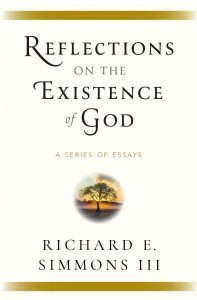
Reflections on the Existence of God: A Series of Essays, by Richard E. Simmons III
I have a precocious granddaughter who is in the sixth grade but reads and reasons at the high school level. Recently she informed her mother that she no longer believed in God. As I spoke with her, it became apparent to me that she had not based her position on diligent study. Instead, hers was what the author might call “irresponsible unbelief.” I suspect she was just being contrary to irritate her mother.
The author asserts, “The question of God’s existence, in my opinion, is the most significant issue in all of life. As renowned French philosopher and mathematician Blaise Pascal said, you’re betting your eternal destiny that you are right.” (pp. 12-13). The core of the author’s rationale is belief in either theism or atheism depends on which view is in harmony with reality. From that position, he challenges the reader to “believe responsibly.” According to him. “We stubbornly hold on to our beliefs because they generally reflect how we want life to be rather than how life actually is. For this reason, evidence does not seem to matter.” (p. 19).
While I am certain God exists, that he made us and loves us so much he was willing to die for us, I found this work helpful in synthesizing what I already knew about God while providing solid arguments against disbelief. Two of the most surprising bits of information about atheists I gleaned from my reading had to do with their thinking as they neared death and the fact they knew next to nothing about the faith they rejected throughout their lives. He concluded, “The evidence for God is really of little use if a person does not want Him in his or her life.” (p. 22)
The author logically addressed the existence of evil in the world, the source of a moral standard along with truth, love, happiness and beauty. He recounted the efforts of Einstein to discredit a transcendental source of morality and the irony that his General Relativity theory demonstrated the universe was not eternal. He proved it had a beginning. One is left to wonder if it extends back to a “Big Bang” who or what spoke that “Bang” into existence? Since Einstein’s theory might have pointed to a creator, he introduced a fudge factor, which was later discovered and discounted by other sceintists.
According to Simmons, Darwinism is, likewise, proving to be “a philosophical bias more than a coherent science.” (p.174) Some scientists find it easier to introduce aliens into the creation process than to acknowledge the existence of God. The author points to Dr. Paul Vitz who concluded “atheists often develop their beliefs because of non-rational psychological reasons, not because of investigation of the evidence and coming to a sound rational conclusion.” (p. 114) I highly recommend this book for anyone interested in adding logic to your faith.
Reflections on the Existence of God: A Series of Essays, by Richard E. Simmons III (Union Hill Publishing, 2019)
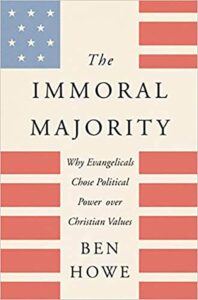
The Immoral Majority by Ben Howe
I believe it is inappropriate for politics to enter the pulpit. The Founding Fathers intended the separation of church and state to exclude government from the sanctuary. It was a court case that turned that concept around and may have given birth to a sense of “if you can’t beat ‘em, join ‘em” among evangelicals. But, historically, when the Church delved into politics, things did not turn out well. The decline of the Roman church was accelerated by the conversion of Constantine and the establishment of a government-supported church. The German Lutheran Church sold its soul by supporting Adolph Hitler. (For more details, see my blog entitled, Silence is Evil). Yet, over the past few election cycles the church has increasingly begun to define faith in political terms. In the interest of transparency, I am a graduate of Liberty University Baptist Theological Seminary. But the pride I once had in that diploma disappeared with the support its founder’s son gave President Trump during both his candidacy and presidency. Falwell’s own fall from grace has mitigated some of the tarnish from my diploma, but not entirely. I still discard every piece of mail from there without reading it. This book helped me articulate what I have been feeling. I highly recommend this work and encourage anyone sensing a disconnect between our faith and politics to invest some time to read it.
The author is the son of an evangelical pastor with strong, prior ties to Liberty University and its founder Jerry Falwell, Sr. He asserts the moral majority has lost its way and reveals an ungodly change in American evangelicalism. He begins by recounting his own sin, which he described as ‘garbage’ resulting from a social media exchange and cautions us all that the key to being a good person is accepting our own capacity to be garbage. He claims his book describes “what happens when the people who believe they have the moral high ground find themselves on the low road.” He asserts evangelicals turned a blind eye to the actions of the Trump administration in exchange for a “greater moral consideration.” And he continues with, “They believe that one should be more concerned with the lives and happiness of their children than whether or not a president is a lying, philandering, unethical charlatan.” If you recall, the intent of original Moral Majority was the exact opposite of that view. That Moral Majority believed character matters.
The author realized the Moral Majority had morphed into something far removed from the vision of its founder when Falwell’s son, Jerry Falwell, Jr., posed with Donald Trump in front of the cover of a pornographic magazine his father fought against. The author reminds us of Jerry Falwell’s Herculean efforts to see Larry Flynt the publisher of a different pornographic magazine turn to Jesus. And he observed, “. . . here was Falwell’s son, not seeking to “save” a man who was cut from the same cloth as Flynt but rather to endorse an effort to put such a man into the most influential position on the face of the Earth.” He quoted Michael Farris, chairman of the Home School Legal Defense Association, “Today, we see politics fully influencing a thousand Christian leaders. This is a day of mourning.” The author clarifies the words of Ferris with, “In a generation, the movement had changed, he was saying, from trying to be a force for change in politics, to being forcefully changed by politics.”
Howe maintains the prevailing view of evangelical Trump supporters is “you do not question the vessel,’ and goes on to observe Trump cannot be considered a hypocrite because he lacks a personal moral code to betray. The author asserts the president, “pulls many evangelicals into a vortex of moral ambiguity and relativism that has become almost required to continue supporting him.” To punctuate that idea, he continues, “Donald Trump is the single greatest source of hypocrisy I’ve seen in a movement already perceived by many as pharisaic.” We have become that which we have despised.
He then makes a case for evangelicals to adopt what he calls ‘empathetic conservatism,’ by which he means “speaking to people in a way that is optimistic and helps them see a brighter future without abandoning our principles or compromising our beliefs.” That is a far cry from the words shouted by some pastors since the election. The author addressed this, as well,” . . . creating a “Christian” culture that has become divisively self-interested and bitterly self-righteous, these leaders have taught their flocks to value the things of the world, rather than the things of Christ.” He maintains, “for the Trump right, the end of overthrowing the popular left’s regime is worth achieving by any means necessary.” He concludes by making reference to Christ’s Sermon on the Mount. “That brings me back to the evangelical movement at large, which has a rather massive log in its eye at the moment. For the possibility of a bit of worldly influence, they surrendered their moral voice in the public sphere.”
The Immoral Majority: Why Evangelicals Chose Political Power Over Christian Values by Ben Howe, Harper Collins/Broadside Books, 2019

2000 Years of Charismatic Christianity by Eddie L. Hyatt
This will be the first time I have reviewed a book that I do not wholeheartedly recommend to everyone, but not because I didn’t like it or disagreed with the author’s thesis. It certainly served the purpose for which I purchased it and if you share my interest, I can recommend it to you. For several months I had been wondering what happened to the Charismatic Renewal that seemed to regularly make news in the 1960’s and 70’s. It was a very exciting time for much of the church world. Some churches were alive with an outpouring of Apostolic gifts, including healing, prophesy and speaking in tongues. And the anticipation of the Lord’s return was palpable. Hyatt does a wonderful job of describing the survival of those gifts to the Reformation and highlights many subsequent movers and shakers of what many called the “latter rain.” While very readable, despite its title, it is neither scholarly nor comprehensive. It does a credible job of highlighting what happened in some Holiness congregations in the first third of the 20th century but, otherwise, seemed largely focused on the Assemblies of God. Only brief mention was made of Oneness groups, which made me wonder if the author was not inadvertently succumbing to his own biases. That suspicion resurfaced with his omission of any mention of the contributions of Aimee Semple McPherson, who was not Oneness, but not Assembly of God either. The omission was highlighted by the fact the Federal Government acknowledged her significant contribution, not only to modern Pentecostalism, but to contemporary Christianity itself. Angelus Temple might be considered the first mega church that fed both stomach and soul. This is what the National Parks Service had to say about it and her during National Women’s Month in 2002, the year of this book’s publication.
The Angelus Temple, located on Glendale Boulevard in Los Angeles, California, was designated a National Historic Landmark on April 27, 1992. The Angelus Temple is historically significant as the base of operations for Aimee Semple McPherson, a pioneer in the field of radio evangelism. McPherson set a number of important precedents for women in religion in the early part of the 20th century; she was the first woman to receive a FCC radio license and she was a pioneer religious broadcaster. On radio station KSFG (sic) and in her preaching at the Angelus Temple, McPherson was an innovator in incorporating Hollywood and vaudeville style entertainment into her sermons. In addition, she mobilized an extensive social ministry from her headquarters at the Angelus Temple. McPherson provided a social and educational center for thousands of Midwestern immigrants, and during the Great Depression she provided hot meals for thousands of hungry people. She also widened the appeal of Pentecostalism to millions of people via her tours and radio broadcasts, and her founding of a Bible College to train missionaries, ministers, and evangelists.
(http://www.nps.gov/nr/feature/wom/2002/angelas.htm)
The author provides a broad-brush perspective, and, in a backhanded, thoughtful way refutes Pastor John MacArthur and his Strange Fire cessationism. The historical insight into where the Church and charismata parted ways, proved George Santayana was right. “Those who do not remember the past are condemned to repeat it.” Contemporary controversy notwithstanding, what stirred my heart most was the details he provided regarding those Pentecostal pioneers who hungered and thirsted until they were filled. Hyatt made me hungry for revival; to see God move again in a mighty way in my life, the Church, our community and our nation.
2000 Years of Charismatic Christianity by Eddie L. Hyatt, Charisma House Charisma Media/Charisma House Book Group, Lake Mary, Florida.
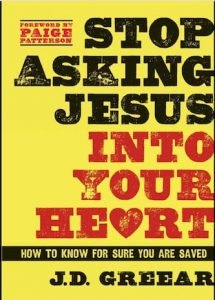
Stop Asking Jesus Into Your Heart: How to Know for Sure You Are Saved by J.D. Greer
I used to think that becoming a missionary meant learning a new language, leaving home and traveling to the far ends of the globe. But when I stopped to listen and look around, I found a field white for harvest in my community, my neighborhood and in my church. Yes, in fact, they might even be on the pew next to me on Sunday morning. Anyone who considers her or himself an evangelical knows we have been tasked with making disciples. (Matthew 28:19-20) For me, that has always been doing all I can to help someone ask Jesus into their heart and that has typically included some version of the “Sinner’s Prayer.” Is that really how we become Christians? The author asserts, “Nowhere does the Bible say we have to voice a prayer to be saved. The posture of repentance and belief saves.” (Kindle location, 829) What it means to be truly saved is the point of Stop Asking Jesus Into Your Heart: How to Know for Sure You Are Saved, by J. D. Greer (Nashville: B & H Publishing, 2013, Kindle).
If you consider yourself a Christian, how did you arrive at that conclusion? For too many of us it was simply a “decision for Christ,” usually including a statement of belief, some version of a prayer for forgiveness and a request for Jesus to enter our heart. Yet, for many of us that decision included no commitment to be like Jesus. I think a better title for this book might have been Repent, Rinse, Repeat. “Repentance is belief in action. Repentance and belief are, biblically speaking, parts of the same whole.” (Kindle location, 744-47) Ask anyone you know who only attends church on Easter and/or Christmas if they believe in Jesus and they will likely respond in the affirmative. Yet that belief is not confirmed by a changed life. Those who are not doing all they can to look and act like Jesus—to be disciples, have cause to wonder about their salvation. “Following Jesus means submitting to Him in all areas at all times regardless of whether you agree with what He says or not.” (Kindle location, 1077
The last time repentance was proclaimed as loudly as Greer does to a church and a generation that had lost its way was 1937. The one doing the proclaiming was Dietrich Bonhoeffer who stated flatly, “That is what we mean by cheap grace, the grace which amounts to the justification of sin without the justification of the repentant sinner who departs from sin and from whom sin departs. . .Cheap grace is the preaching of forgiveness without requiring repentance . . .” (Dietrich Bonhoeffer, The Cost of Discipleship, (New York: Touchstone, 1995, Kindle, location 549) Greer is even more direct than Bonhoeffer when he says, “Apart from repentance there is no salvation. . . . Placing an overemphasis on phrases like ‘ask Jesus into your heart’ gives assurance to some who shouldn’t have it and keeps it from some who should.” (Kindle location, 254) He continued by citing a 2011 Barna study that found nearly half of all adults in America had prayed such a prayer, leading them to believe they had their ticket punched for heaven, “though many of them rarely, if ever, attend a church, read the Bible personally, or have lifestyles that differ in any significant way from those outside the church.” (Kindle location, 233)
Like many serious believers today, Greer’s heart is breaking over people sitting next to us on the pew or living beside us who profess faith in Christ, but are as lost as someone who has never heard the gospel. The author reminds us, “Jesus warned that there are a vast number of people who seem assured of a salvation they don’t actually possess.”( Kindle location, 183).) We often hear that once we are saved we are saved eternally. That is true if we persevere until we die. (Matthew 24:13). Greer summed it up like this, “Repentance and faith are postures you begin in a moment but maintain for a lifetime.” (Kindle location, 1832)
Stop Asking Jesus Into Your Heart: How to Know for Sure You Are Saved, by J. D. Greer (Nashville: B & H Publishing, 2013)
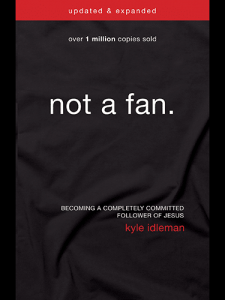
Not a Fan: Becoming a Completely Committed Follower of Jesus by Kyle Idleman
The author quoted Donald Whitney who said, “If a person is wrong about being right with God, then ultimately it really doesn’t matter what he or she is right about.” (p.103) There are few books that I can point to as being significantly life changing, but this is one of them. Like a lot of the people I know who grew up in church, I surrendered to Jesus as a child. I didn’t fully appreciate what it meant, but trusted that I was eternally secure as I went on living my life pretty much like my unsaved friends. To be honest, I think I just chose Jesus and heaven over the alternative. Even after I made the decision to serve the Lord intentionally, I was not what the author would call “fully committed.” As I look back on it, it wasn’t that I didn’t want a relationship with Jesus; it’s that I wanted it on my terms. And that, according to the author, made me a fan, rather than a follower.
I began serious self-examination when I read his description of what I was experiencing in my own church at that time. “The biggest threat to the church today is fans who call themselves Christians but aren’t actually interested in following Christ.” (p.25) I realized I was there for the music and sermon, not to glorify God with my worship. I, along with many of the folks with whom I regularly attended services, fell into the category of enthusiastic admirer, a fan, (p.24) not a follower. “Following Jesus requires a complete and total commitment.” (p.148) First-century believers used the word “slave” to describe their relationship with Jesus. And the author asserts, “You can’t call Jesus Lord without declaring yourself his slave.” (p.151) I was far from being Christ’s slave. Instead, I was one of those who praised him when things went well, but knew nothing of the sacrifice and pain often experienced by a genuine disciple. “If any of you want to be my followers, you must forget about yourself. You must take up your cross every day and follow me” (Luke 9:23 | CEV). “If there is no sacrifice involved, if you’re not at least a little uncomfortable, then there is a good chance that you aren’t carrying a cross.” (p.161)
I knew all about Jesus, but truth be told, I really didn’t know him well enough to understand that, for genuine disciples, he must be both Lord and Savior. My relationship with him ended at Savior. I wanted him to meet me in the hereafter, but I was not too wild about surrendering every facet of my life to him in the here and now. Unlike the sermons I was hearing at the time, the author stresses that genuine followers must count the cost before placing their hands on the plow. He reminds the reader that when Jesus explained exactly what it meant to follow him, many left.
Early in the book, the author provides this cautionary statement that encapsulates his thesis. “I hope you will read this book and discover with me what it really means to follow Jesus. I will talk more about repentance than forgiveness, more about surrender than salvation, more about brokenness than happiness, and more about death than about life. The truth is, if you are looking for a book about following Jesus that lays out a comfortable and reassuring path, you won’t find it here.” (pp.14-15)
Not a Fan: Becoming a Completely Committed Follower of Jesus, by Kyle Idleman (Grand Rapids: Zondervan, 2011)
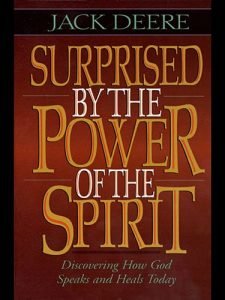
Surprised by the Power of the Spirit: Discovering How God Speaks and Heals Today
The title of the book instantly captivated my attention, but the content is reshaping my thinking, dulled by too much hospital chaplaincy training. Too often, advocates of what many call the ‘apostolic gifts’ are are written off as uneducated and unenlightened, religious fundamentalists. Dr. Deere certainly does not fit that mould. He approaches an important topic with great sensitivity and intelligent argument.
Like, Dennis J. Bennet, an Episcopal vicar, who had the courage to address similar topics in 1970 with the publication of his ground-breaking book, Nine o’Clock in the Morning (Newberry, FL: Bridge-Logos Publishers, 2011), he leads serious Christians to ask ourselves why we believe some of the things that we do. One cannot help but reflect on statements like, “Our environment, our theological traditions, and our teachers have much more to do with what we believe than we realize. In some cases they have much more influence over what we believe than the Bible itself.” Much like the author, before his encounter with the Holy Spirit, I discovered that I had made my God too small. Feeling I needed to defend God in the event he did not heal, I was afraid to ask for the miraculous.
He argues against the generally accepted belief that healing and other spiritual gifts ceased with the apostles. And asserts it is more a matter of experience than sound exegesis. “The doctrine of cessationism did not originate from a careful study of the Scriptures. The doctrine of cessationism originated in experience.” He continues with, “Christians do not disbelieve in the miraculous gifts of the Spirit because the Scriptures teach these gifts have passed away. Rather they disbelieve in the miraculous gifts of the Spirit because they have not experienced them.”
That statement reminded me of a conversation I had late one night with a chaplain from a developing country who said Pentacostalism was growing like wildfire in his home country where doctors were few, but people’s faith was high. He said miraculous healing reports from there were regular and numerous.
Dr. Deere acknowledges that most Christians have seen that not everyone is healed by prayer and reminds us healing reflects God’s soverignty. It is a manifestation of God’s will. He decides who will be healed and why. He further reminds us that God even allowed the healing ministry of Jesus to be limited, at least on some occasions, by the unbelief of the people. Yet, he cautions against believing healing is a simple case of having sufficient faith. I strongly recommend this book and encourage a thorough reading of the appendices because that is where the real “meat” is located.
Surprised by the Power of the Spirit: Discovering How God Speaks and Heals Today by Jack Deere (Grand Rapids: Zondervan, 1996)
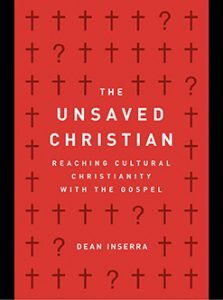
The Unsaved Christian: Reaching Cultural Christianity with the Gospel by Dean Inserra
This work is an insightful analysis of contemporary Christianity and a must read for everyone interested in doing the three things Jesus left his followers to do: love God, love others and make disciples. Its author suggests those who need the gospel most may be those who know the most about Jesus. They have heard the gospel preached but have never understood how it relates to them on a personal level. They have not recognized they are sinners and repented, yet they call themselves Christians.The author asserts, “Unsaved Christians thrive where church membership means nothing and is available to all, without anything changing the day after you “sign up.” He continues by suggesting that the most underrated mission field in America isn’t the millennials who were raised without church or those who have left the faith of their youth. He suggests the most challenging mission field is inside the church, specifically what he calls ‘Cultural Christians.’ He defines them as people who have “a mindset that places one’s security in heritage, values, rites of passage (such as a first communion or a baptism from childhood), and a generic deity, rather than the redemptive work of Jesus Christ.” They have heard all the Bible stories and profess faith in a god, but their god is a generic deity rather than the God of the Bible. It is difficult for them to accept their need for a savior when they already believe certain facts about Jesus. But trusting him as savior and surrendering to him as lord are not the same thing as simply knowing things about him. The author concluded the Cultural Christian’s most common belief is that good people go to heaven. In fact, according to him, they are the champions of that idea, since they believe they have already checked that block. That idea pretty much parallels the thinking of their unsaved neighbor who, likewise, does not recognize he or she is unsaved. Yet both must first see themselves as lost before they appreciate their need to be found. As I read his description of them, I could not help but compare Cultural Christians with Pharisees. Like those religious people of Jesus’s day, many are self-righteous, rule-followers who, while they may argue to the contrary, believe personal works justify them before God. And, as Inserra concludes “good works can be the very thing preventing someone from seeing their need for Christ.” He recommends three things for those willing to enter this mission field: “a refusal to be in denial, gospel clarity, and boldness to speak the truth in love.” That truth highlights God’s holiness, stresses the consequences of sin, the necessity of forgiveness, and the fact reconciliation is only possible for those who believe the gospel by faith.
The Unsaved Christian: Reaching Cultural Christianity with the Gospel, by Dean Inserra (Chicago: Moody Publishers, 2019)
